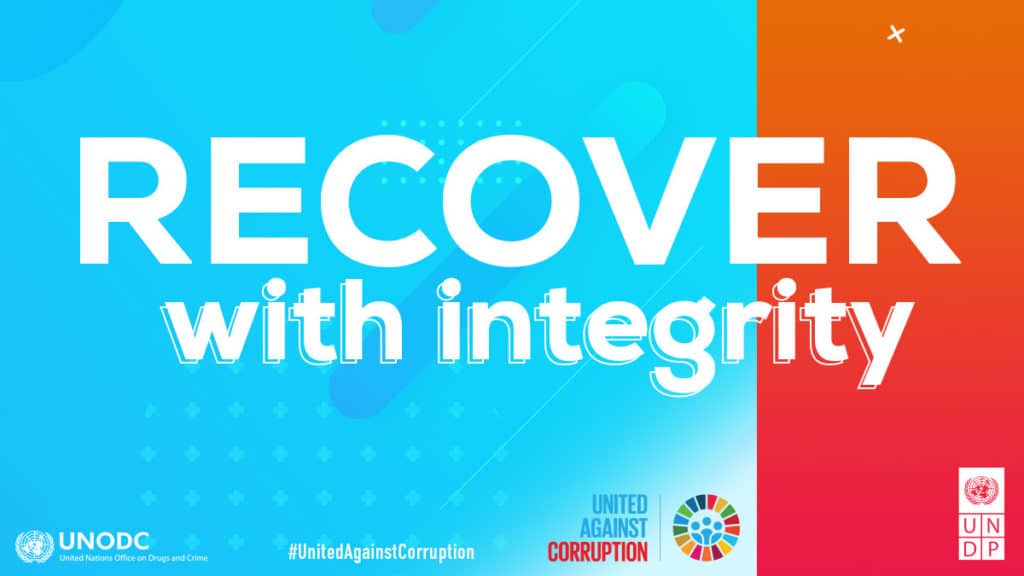December 9 is the United Nations (UN) International Anti-Corruption Day, and this year’s theme is “Recover with Integrity.” The theme focused specifically on the corruption that has occurred during the pandemic. The UN is urging participants to post on social media to spread awareness about global corruption and urge lawmakers around the world to combat corruption.
The UN General Assembly first designated December 9 as International Anti-Corruption Day in 2003 with the adoption of the United Nations Convention against Corruption, and the designation “entered into force in December 2005,” according to the UN website. The United Nations Development Programme and the United Nations Office on Drugs and Crime are “at the forefront” of efforts to fight corruption.
In this year’s theme of “Recover with Integrity,” the UN has compiled resources on six “corruption scenarios” that highlight corruption during the COVID-19 pandemic. In order to combat corruption during these especially tumultuous times, the UN argues that there is a need for “involvement of strong anti-corruption bodies, better oversight over emergency support packages, more open and transparent public procurement and enhanced anti-corruption compliance by the private sector,” according to the webpage for International Anti-Corruption Day. “In addition, countries also need to ensure support to and protection for whistleblowers and journalists uncovering corruption during the pandemic as well as bring their national anti-corruption frameworks in line with the United Nations Convention Against Corruption (UNCAC).”
Of the six scenarios, two mention whistleblower protection as integral to fighting corruption: Scenario 1: Corruption and Public Health and Scenario 3: Corruption in the context of Public/emergency procurement. The public health-centered scenario mentions that whistleblowers in the health sector “have lost their jobs after raising concerns about corruption and wrongdoing.” The scenario notes that “In other cases, healthcare workers are being forced to work in unsafe conditions while corrupt networks profit from highly overpriced and lucrative government contracts and the unlawful and questionable sales of medical supplies.” The public/emergency procurement scenario emphasizes “Wrongdoing can only be addressed when whistle-blowers feel safe to report a violation within their organization with assurances of protection from retaliation and reprisal.” The text continues, “According to studies, women especially decide on whether to report corruption or not, based on the level of confidentiality and protection within an organization.” This scenario urges governments to put in place “safe reporting systems…to enable whistle-blowers to step forward. Whistle-blowers are key to tackle corruption and RECOVER with INTEGRITY, accountability, and transparency.”
The spotlight on health workers and COVID-19 whistleblowers is well deserved, as whistleblowers have been integral to the exposure of fraud and misconduct in government and institutions’ response to the pandemic. High-profile whistleblowers like Dr. Rick Bright, who blew the whistle on the U.S.’ pandemic response, have been in the headlines, but whistleblowers from all over the health sector have been in the news exposing fraud, misconduct, and lack of COVID-19 safety precautions. Relief charge nurse Jhonna Porter was allegedly retaliated against for trying to warn her coworkers that their hospital was not providing proper COVID-19 precautions for staff and patients.
Recovery from the pandemic must include measures to prevent and combat corruption and bribery.” the UN Secretary-General António Guterres wrote in a statement. “We need broad partnerships to strengthen oversight, accountability and transparency, building on the global anti-corruption tools provided by the United Nations Conventions against Corruption.”
“A world made poorer and more fragile by the pandemic cannot afford to let corruption compromise our efforts to build forward, or our hopes for a fairer future,” said Ghada Waly, executive director for the UN Office on Drugs and Crime, in a video. “We need to stand up for justice, and stand united against corruption.”
